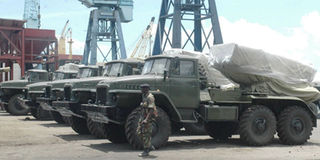Sudan ‘arm twisted’ Kenya to get tanks

A military officer walks past some of the military tanks after they had been off-loaded from the MV Faina ship on February 2, 2009. Photo/FILE
The Government of Southern Sudan threatened to review its relations with Kenya if it reneged on delivering 32 Russian-made tanks, leaked US cables revealed.
At the time, Kenya was under intense diplomatic pressure from the US that had also warned of unspecified sanctions if the tanks reached South Sudan.
The confidential cables indicate that the dilemma, coupled with Nairobi’s desire not to upset Khartoum, forced the authorities to craft a path through Uganda.
This arrangement, one of the cables from Nairobi explained, was detested by military officials. Publicly, the government denied that the T-72 tanks were destined for South Sudan.
But US ambassador Michael Ranneberger observed in one of the cables in October 2008 that it was “a poorly kept secret” that the tanks were bound for the Government of South Sudan”.
Mr Ranneberger, according to the cables, added that “the Government of Kenya has been facilitating shipments from Ukraine to the Government of South Sudan since 2007.”
The envoy further briefed his boss that since 2007, Kenya’s Ministry of Defence has played a major role in assisting the Government of South Sudan receive arms shipments from Ukraine.
“When the shipments are off-loaded at the port of Mombasa, they are transported via rail to Uganda and then onward to South Sudan,” the cable states.
“Military officials have expressed discomfort with this arrangement, however, and have made it clear to us that the orders come from the top.”
Deter weapons transfer
Kenya’s key role in the negotiation and signing of the Comprehensive Peace Agreement that ended two decades of war in Sudan did not deter the political leadership from transferring weapons, argued the envoy.
The clandestine methods employed by Kenya to transfer the weapons, the US deduced, supposedly arose from the fact that the country’s political leadership want to support the South Sudan but not in a way that would openly provoke Khartoum or potentially threaten South Sudan’s eventual independence.
“Vice President (Kalonzo) Musyoka’s public opposition to the International Criminal Court’s indictment of President Bashir (because it could threaten the CPA) illustrates this point,” the Nairobi cable observed.
Mr Ranneberger guessed it was possible that some senior Kenyan officials were drawing financial benefits in return for facilitating the arms shipments given the country’s corruption record.
“As such, the question of “Who owns the tanks?” will remain a touchy side issue for Kenya in the piracy of the MV Faina.”
The US State Department was concerned about the hijacking of the MV Faina in 2008 as well as its cargo ( the military tanks) and the ship’s destination.
Last year, US Chargé d’Affaires in Khartoum mission Robert Whitehead wrote that a South Sudan Government official admitted that “on the margins of the Washington Forum for CPA Partners, he pressed Foreign Minister Moses Wetang’ula on the need to expedite delivery of the tanks.
The official with instructions from a higher authority in South Sudan told Mr Wetang’ula that “if the tanks did not start moving by July’s end, the GOSS would be forced to “re-evaluate its relationship with Nairobi.




